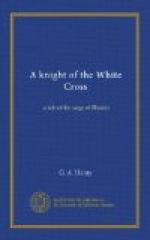As it wound through the streets in splendid array, the grand master and officials in all their robes of state, the knights in full armour and the mantles of the Order, while the inhabitants in gala costume lined the streets, windows, and housetops, the ladies waving scarves and scattering flowers down on the knights, the roar of great cannon on the south side of the city showed that the Turks had commenced the attack in another quarter. Without pausing, the procession continued its way, and it was not until the service in the chapel had been concluded that any steps were taken to ascertain the direction of the attack. As soon as it was over, the knights hastened to the walls. During the night the Turks had transported their great basilisks, with other large pieces of artillery, from the camp to the rising ground on the south side of the city, and had opened fire against the wall covering the Jews’ quarter, and at the same time against the tower of St. Mary on the one hand and the Italian tower on the other.
From other commanding spots huge mortars were hurling great fragments of rock and other missiles broadcast into the town. The portion of the wall selected for the attack showed that the Turks had been well informed by their spies of the weak points of the defence. The wall behind which the Jews’ quarter lay, was, to all appearance, of thick and solid masonry; but this was really of great age, having formed part of the original defences of the town, before the Order had established itself there. The masonry, therefore, was ill fitted to resist the huge balls hurled against it by the basilisks. The langue of Provence was in charge of this part of the wall, and, leaving them for the present to bear the brunt of the storm, the grand master sent the knights who could be spared, to assist the inhabitants to erect shelters against the storm of missiles falling in the town.
Sheds with sharply sloping roofs, constructed of solid timber, were built against the inner side of the walls, and beneath these numbers of the inhabitants found refuge. The work was performed with great celerity by the inhabitants, aided by the gangs of slaves, and in two or three days the townspeople were all in shelter, either in these sheds, in the vaults of the churches, or in other strongly constructed buildings.
Among the missiles hurled into the town were balls filled with Greek fire, but the houses being entirely built of stone, no conflagrations of importance were caused by them, as a band of knights was organised specially to watch for these bombs, and whenever one of them was seen to fall, they hurried from their lookout to the spot, with a gang of slaves carrying baskets of earth and buckets of water, and quenched the flames before they had made any great headway.
The roar of the bombardment was almost continuous, and was heard at islands distant from Rhodes, telling the inhabitants how the battle between the Christians and the Moslems was raging.




